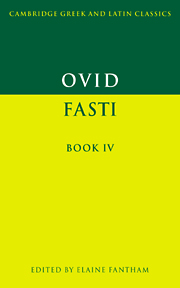Introduction
Published online by Cambridge University Press: 05 June 2012
Summary
THE FASTI IN ITS HISTORICAL CONTEXT
By February of 2 BC, when Augustus finally consented to accept the title of Pater Patriae celebrated in Fasti 2.131–44, Ovid was forty years old. He was renowned as a love poet, author of three books of ostensibly autobiographical Amores, a collection of love letters from Penelope and a range of abandoned heroines, and a tragedy based on the deserted Medea's child murders. In his latest work, the Ars amatoria (advice to lovers), he brought together seduction and dynastic politics as he celebrated the departure of the young prince Gaius Caesar's expedition to secure the submission of Rome's enemy Parthia by war or diplomacy, and anticipated the prince's triumphant return as a future occasion for amatory encounters. But neither Gaius nor his younger brother and co-heir Lucius Caesar lived to return. By AD 4, Augustus had no other potential heir than his stepson Tiberius, a man of Ovid's own age but of very different temperament, hardened by campaigning and embittered by dynastic in-fighting. This year opened the last unhappy phase of Augustus' forty-two years as Princeps, marked by famine, rebellion and the military disaster of Quintilius Varus' three legions annihilated by a Roman-trained German prince in AD 9. On the domestic front the family scandal which caused the exile of Augustus' daughter Julia for adultery in 2 BC was renewed by the fate of her daughter.
- Type
- Chapter
- Information
- Ovid: Fasti Book IV , pp. 1 - 54Publisher: Cambridge University PressPrint publication year: 1998



